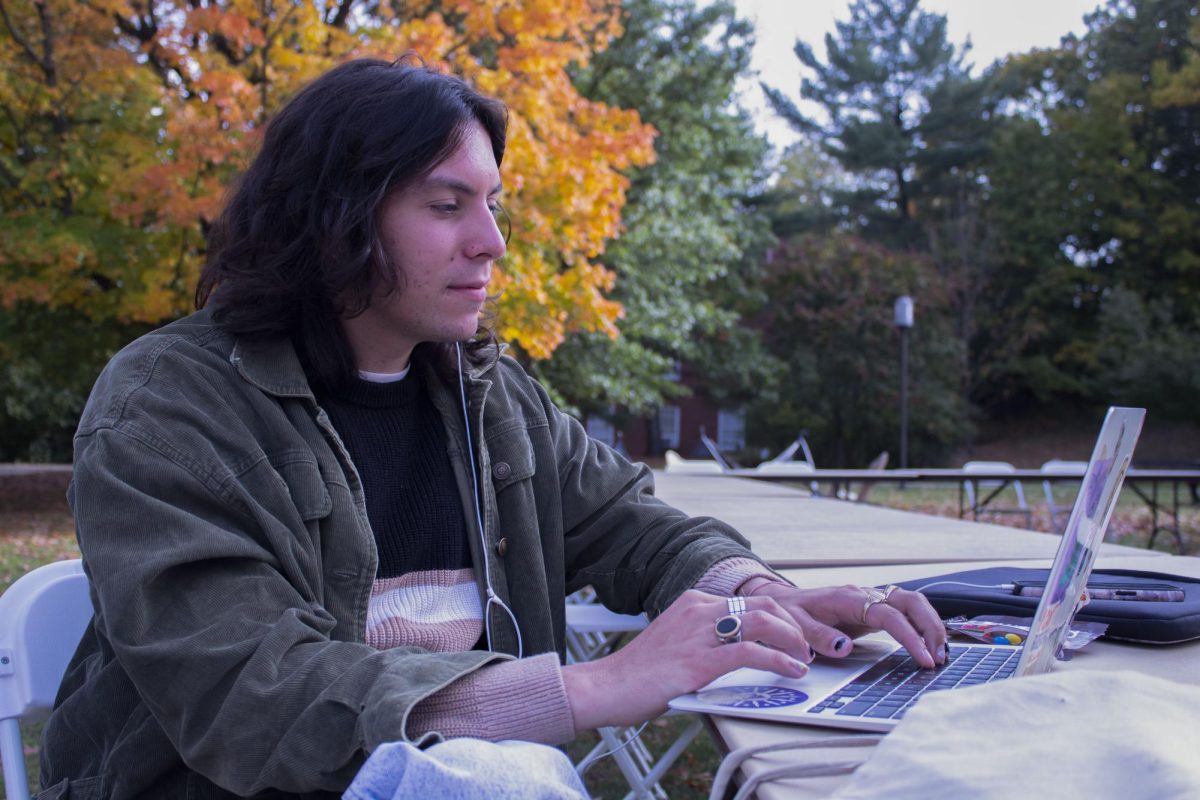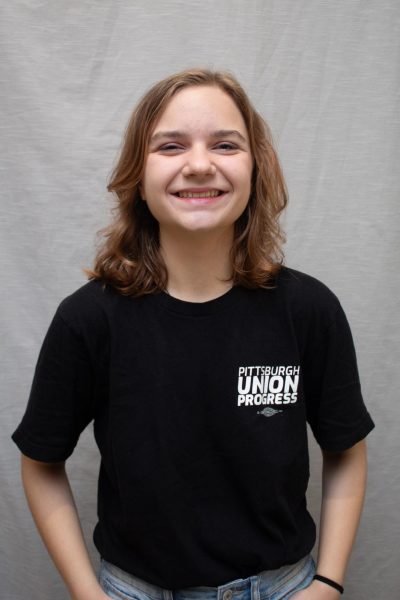If you start a conversation with Carson Gates ‘25, it’s unlikely you’ll get away without hearing about the Communiqué. He wears his love for the outlet on his sleeve quite literally, sporting a tattoo of an opossum, the Communiqué’s unofficial mascot, reading the paper on his arm.
He estimates that he spends anywhere from 10 to 25 hours a week as editor-in-chief working on the paper. Every weekend before a print issue comes out, he’s looking over stories on Saturday morning and up on Sunday night putting the finishing touches on layout.
This has been his life for the past two years. Gates joined the Communiqué at the first pitch meeting of his first semester at Chatham University in fall 2021. He hadn’t even been on staff for the full semester when he applied for the role of editor-in-chief.
Now, he’s stepping down. The editor-in-chief position is a two-year contract, so Gates is training his replacement, Bella White ‘27. With mixed emotions, Gates reflects on the highs and lows of a position that saw its fair share of large stories, including the University-wide reorganization which began at the start of his second year as editor-in-chief.
Answers have been shortened for clarity and conciseness.
AH: Over the past two years, you’ve been the Communiqué’s editor-in-chief for every print issue. How are you feeling about stepping away from the role?
CG: It’s honestly pretty bittersweet right now. Looking back over the past few years, I’m super proud of the growth the Communiqué has made in so many different aspects. I think the real bitter part now is we were really hitting our stride in the past few months, and I think, internally, I think it’s a little hard to let go and take a step back next year, but I’m really excited to maybe take on some new passion projects.
AH: Why did you decide to apply for editor-in-chief?
CG: I actually had zero interest in doing it. The editor-in-chief at the time and the previous one came up to me multiple times my first year and said I should apply. I didn’t feel like I had any sort of capability or was qualified, but I cared about the Communiqué. I cared about the work we did.
AH: This semester, you’re a goalie on the men’s hockey team, an intern with the Pittsburgh Penguins, a writer for Trainwreck Sports, a full-time student and the editor-in-chief, how do you juggle all that?
CG: My mom asks me that all the time, and I cannot give her an answer. I think I’m in a really good routine. I know what my schedule looks like. I don’t want to say I live off my Google Calendar, but it is something I need to have every day, so I don’t double-book things. I’m in a good spot where I’m thankful enough that in these positions, the people around me know how busy I am and allow me to have a flexible schedule.
AH: What are you going to do with all this free time once you’re done being editor-in-chief?
CG: I don’t know. I think about that a lot. Circling back to my mom, she asked me that too. It’s something where I’m really excited because these past two years, especially this past year, I’ve had to put off a lot of passion projects and things I love doing and what kind of got me sucked into journalism. I’m really excited to dive into sports for the Communiqué next year.
AH: What role will you have with the Communiqué after being editor-in-chief?
CG: I’ll be at meetings. I’ll sit in the back. I’m not going to impose myself whatsoever because I want [White] to run things. I think my big thing is just kind of solidifying sports because I think it makes every editor-in-chief’s job a lot easier if sports is taken care of. My goal is just to make [White’s] life easier.
AH: What do you think is the biggest change in the Communiqué from when you began as editor-in-chief to now?
CG: People are friends on staff now. I think our camaraderie is what I’m most proud of. Our work has grown immensely. We’ve won four awards just recently, and I’m really proud of our accomplishments and the way we’ve covered the school in the past two years, but none of that would be possible without the group we have in the newsroom. I wanted staff to be close hanging, staff to hang out outside of the newsroom, and we’ve done that. I wanted to kind of give the Communiqué a sports culture because that’s something I love so much about sports. We try to get together outside of the newsroom, and I think that’s what means the most to me to see people on staff hanging out in Café Rachel and seeing them walking on the Quad together.
AH: You mentioned the Communiqué has recently become an award-winning publication. What do you credit that to?
CG: I credit that just to people we’ve got on staff. I’m only as good as the people that write for us, the people on staff, and all the credit goes to the work everyone does, hours of countless work people are doing. I think all that comes down to just the hours and hours and hours spent to make us better journalists, to make us better people.
AH: You managed the staff throughout the coverage of the reorganization from the first moment it was announced. What was the strategy you took to that?
CG: My strategy for that, I think for most of my time as editor, has been to have a hands-off approach in a lot of it. I try to guide people in the right direction. I think that’s something I’ve learned the longer I’ve been editor-in-chief is our work is so much better the less I’m involved with it because it lets people grow and get better. I think my biggest thing for the reorganization especially was, “How do we get this to our readers? How do we take all this craziness and put it in a palatable way?” I’m really proud of Riley [Hurst Brubaker ‘24], for example, in the reorganization they took the lead on the beginning big story, and they knocked it out of the park. I probably could have been there every step of the way and taken a ton on my plate, but I think things would have been worse outside of that because there would have been other stories I wouldn’t have gotten around to helping out with.
AH: What’s your favorite memory from your time as editor-in-chief?
CG: My favorite professional moment of the Communiqué would have been the past couple weeks. We won the Apple Awards, and seeing the importance of that to our group has meant the world to me. I’ve always been proud of the work we’ve done here, but to have other people outside of the University say the same things and give the great work that our staff does the credit it deserves was my favorite thing to see. Another favorite moment has just been, like, we try to hang out a lot as a staff outside of it, and I look back to my first year at Spring Formal. That was one of the first times we really hung out as a staff outside of the newsroom. I think that moments like that are why the Communiqué is where it’s at now.
AH: How would you describe your time as editor-in-chief in one word?
CG: Unforgettable.
AH: What do you want to do after you graduate?
CG: I want to work in sports media. I think next year a lot of the pieces will be put into place because I’ll have more time for that professional development opportunity away from my role as editor-in-chief. I want to parlay what I’m doing now with the Penguins into something bigger, all the stuff I do with Trainwreck into something bigger. We’ll see what goes on, but ideally, I’d be covering hockey in a professional manner.
AH: Do you have any messages for the readers of the Communiqué as you prepare to end your time as editor-in-chief?
CG: I just appreciate everyone’s support over the past three years. Honestly, nothing makes me happier than seeing people read the work we do, seeing crosswords filled out on tables, walking with a stack of newspapers and someone asking for one. Our whole goal is to get people to read what we do and keep the campus community informed. Seeing that pay off means so much that I can’t really explain because I think sometimes we forget the impact that we have here and seeing our classmates, seeing our faculty, seeing our administration read the work, get informed by the work we do, genuinely means the world to me.




Sarah Naccarato • Apr 30, 2024 at 6:05 pm
thanks im crying!